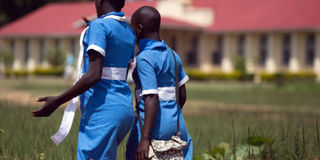47% young girls in Kyankwanzi abused - report

Young girls walk to school. According to the report, youth in Kyankwanzi District are getting lured into early sex yet they lack sexual and reproductive health knowledge. MONITOR PHOTO
KYANKWANZI- Health rights activists have called on the government and the Kyankwanzi District leadership to step up campaigns aimed at helping the youth, particularly young girls, and the disabled to access sexual reproductive health (SRH) services.
In a new study commissioned between 2016 and 2018 by health right activists; Action for Rural Women Empowerment (ARUWE) and Amplify Change in two sub-counties of Wattuba and Nsambya in Kyankwanzi District, the activists noted that the youth are getting lured into sexuality as early as eight years yet they are not equipped with sexual and reproductive health knowledge.
The research also found out that most of the respondents and their peers start sexual activity at an average age of 10 and that majority were sexually active by the age of between 14 and 15.
“Sexual abuse of young girls (8-12 years) is rampant, especially within and out of school youth. As far as culture is concerned, they care more about promoting virginity among girls, but do nothing to control the boys, who feel no law can stop them. Many young people are now promiscuous, both boys and girls,” the report reads, in part.
Defilement
The study revealed that at least 47 per cent of the girls were defiled between 2016 and 2018 in Kyankwanzi and the defilement cases resulted into pregnancy due to the adolescents’ lack of access to sexual and reproductive health services.
“Although the survey also showed 47.2 per cent of the girls were defiled before the age of 18, these girls ideally needed sexual and reproductive health services after the defilement, but results showed that 47 per cent of the abuse incidents resulted into pregnancy. At least 59 per cent of the families did not even know the HIV status of these girls. This is an indication that they did not seek health services after defilement,” the report reads further.
The objective of the study was to assess Knowledge, attitude and practices on sexual and reproductive health (SRH); access to information and services; legal environment of SRH issues and gender budget analysis in Wattuba and Nsambya sub-counties, Kyankwanzi District.
The study revealed that in Wattuba and Nsambya sub-counties, 97 per cent of disabled girls aged between 10 and 24 years have challenges accessing sexual reproductive health services and their major hindrances being mobility and difficulty in accessing justice.
“Access to sexual and reproductive health services is a right of every human being, including adolescents with disabilities,” Mr Kawanguzi said.
He further noted that the programme had empowered the youth and other stakeholders to manage and enjoy their SRH, minimise SRH problems and seek SRH solutions through advocacy campaigns and consequently contribute meaningfully to community development.
According to peer educators and Sub-county Community Development Officers, the girls mainly practice permissive sex for money and material things, while the boys mainly do it because of sexual pleasure and pressure in adolescence, fueled by peer influence and pornography.
Kyankwanzi District is considered as one of the poorest communities in Uganda.




